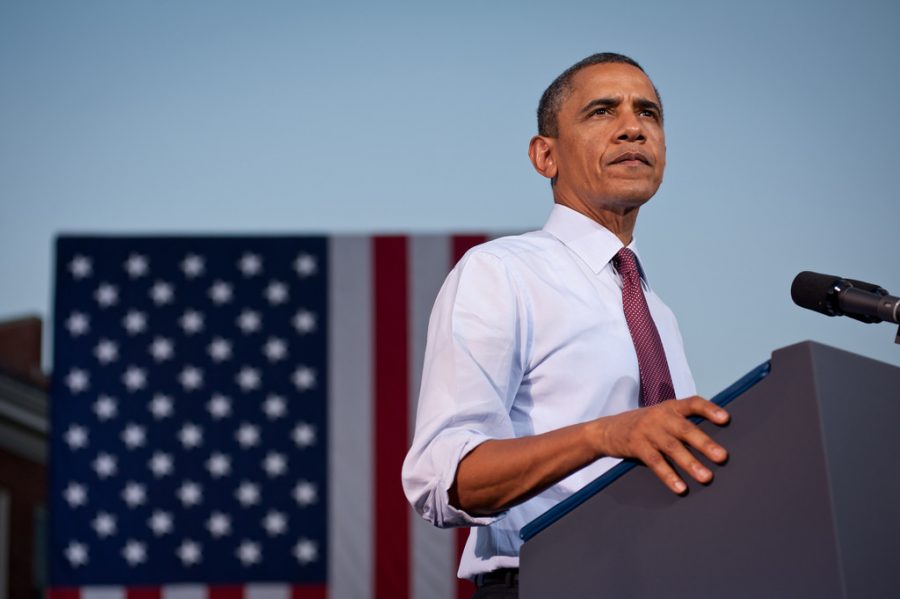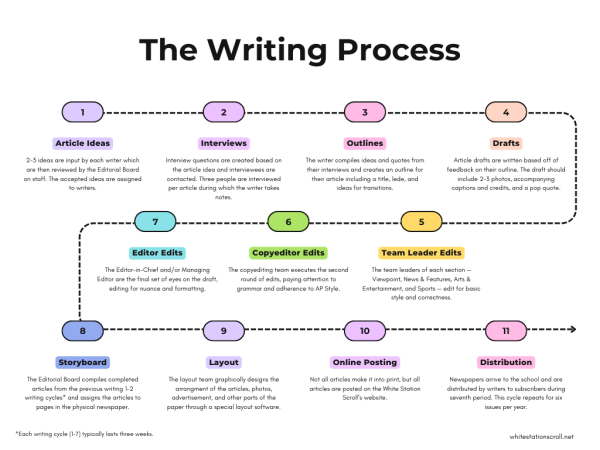Obama out: how policy under 44 shaped the Obama legacy
Public Domain/Used With Permission
Barack Obama giving a campaign speech on Aug. 2, 2012 in Virginia.
“Change will not come if we wait for some other person or some other time. We are the ones we’ve been waiting for. We are the change that we seek.”
On Feb. 5, 2008, on the campaign trail in Iowa, the Illinois Senator Barack Obama uttered these words that he hoped would define his potential presidency for years to come.
Unlike most candidates running to be the leader of the free world, Obama was not what most would call a fully experienced or accomplished politician. Serving in the Illinois State Senate for seven years and in the U.S. Senate for only three years, his rise to the highest office in the country was nothing short of remarkable. However, after Obama served two very eventful terms, the legacy of the 44th U.S. president is up for debate. How future history books will treat his presidency and how the long-term policies of his administration will affect the American people are still under speculation.
Change. Hope. Progress. These were the three tenets of the 2008 Obama campaign. The senator promised to end war in the Middle East, pull the U.S. economy out of recession, sign a universal healthcare bill for all, raise taxes on the rich and much more. Drawing in enormous crowds of Americans suffering from the 2008 recession, Senator Obama’s message stuck with voters and would soon come to spark a progressive movement throughout the country.
-Nov. 4, 2008, Barack Obama broke 270 electoral votes to become the first African-American president in U.S. history.
“I remember feeling extremely happy and proud of the country we lived in at that moment,” Emma Gilpin (12) said regarding the 2008 election night.
Many saw this election as a beacon of hope and change while others were feeling more pessimistic. Nonetheless, with a Democrat-controlled Senate and House, the Obama administration was ready to get to work. In his first 100 days, President Obama began putting many economic regulations on Wall Street, suspending proceedings at Guantanamo Bay, and passing the Economic Stimulus Bill to attack the recession. He worked to improve the crumbling U.S. auto industry by granting many loans which resulted in up to 100,000 new jobs.
Later on, in his first term, President Obama worked to bring about the Affordable Care Act and eventually sign it into law on March 23, 2010. However, many Americans were still feeling as if the promises made by the President during his campaign were not being fulfilled. Unemployment rates were still close to 10 percent, and many still felt ignored by the system.
“Having grown up in a typical middle-class family, I have heard my parents on multiple occasions complain about the increase in income tax and healthcare expenses they had to pay,” Sam Klyce (12) said.
After losing some control in the 2010 midterm election to the Republican Party, President Obama worked towards improving his image and policy. The next two years of his first term were defined by his compromises on tax breaks as well as planning and executing a mission in order to assassinate Al-Qaeda leader Osama Bin-Laden.
“Tonight, I can report to the American people and to the world that the United States has conducted an operation that killed Osama Bin Laden, the leader of Al-Qaeda,” Obama said on May 1, 2011.
Almost immediately, Barack Obama began to win back the hearts of many that voted for him in the 2008 election. In addition, Obama’s declaration of an end to the war in Iraq helped him partially fulfill one of his initial campaign promises. This momentum helped propel his 2012 campaign against former Massachusetts Governor Mitt Romney into victory. For the second time, Barack Obama had managed to accrue just enough votes to make him the most powerful person in the world.
Foreign policy, climate change reform, and job creation were the three main issues that would come to define the second term of the Obama administration. Soon after the 2012 election, President Obama began diplomatic efforts to visit different world leaders and bring the U.S. back to the forefront of many world issues.
In 2013, his administration created the first ever American plan for attacking climate change as well as working towards normalizing relations with Cuba.
In 2015, President Obama brought U.S. participation into the Paris Climate Change Conference and thwarted Iranian nuclear efforts through the historic and controversial Iran Deal. In terms of social issues, Obama championed for gun control efforts and marriage equality for same-sex couples.
At the end of his second term, the Obama administration left the United States with a 4.7 percent unemployment rate, 11.3 million new jobs, a revived auto industry, a healthcare plan, legislation that works to end climate change and much more. According to most media polls, Obama left the White House with close to a 63 percent approval rating, one of the highest in American history.
“There were many pivotal moments for our country [under President Obama], such as finding Osama Bin Laden and the Supreme Court finally legalizing gay marriage,” Gilpin said. “These will always leave a huge mark for the Obama presidency.”
For all of his accomplishments, however, there were many issues not fully addressed or improved under the Obama administration. The U.S. debt nears 20 trillion dollars as wages for most Americans have mostly remained stagnate. ISIS remains a threat to Middle-East stability as the Syrian refugee crisis only worsens. ObamaCare insurance premiums continue to rise, and Americans feel the country is more divided than it has ever been. In addition, despite his promises to thwart gun violence, handgun violence has more than doubled, and simple universal background check legislation failed to pass through the Republican-controlled House and Senate under President Obama.
“I found that Obama did a good job defending the environment and acknowledging climate change as a threat,” Klyce said. “However, I was unsatisfied with much of his work. I found it irritating that he did not acknowledge ISIS as a real threat until much damage had been done in the Middle East and many lives had been lost.”
Both the accomplishments and ailments of the last eight years set the tone for the 2016 election. Now, the legacy of the Obama administration sits in the hands of President Trump, who has promised to undo most of the legislation passed over Obama’s terms. The Affordable Care Act, climate change legislation, immigration policy, the Iran Deal and many more Obama hallmarks are vulnerable to repeal and replacement under this new administration. The American people will not have to wait long to see how President Trump’s policies will affect the legacy of his predecessor.
No matter your political leanings, it is very hard to deny how consequential the presidency of Barack Obama was. Whether for good or bad, Obama was an incredibly active leader that changed the U.S. political spectrum for years to come. Only time will tell how the America of tomorrow will view the eight years that were the embodiment of the Obama Administration.
Your donation will support the student journalists of White Station High School. Your contribution will allow us to purchase equipment and cover our annual website hosting costs.







































